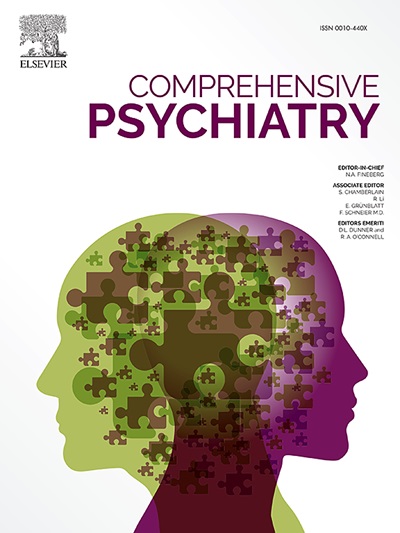Adverse childhood experiences and problematic use of the internet among a child and adolescent psychiatric clinical population.
IF 4.2
2区 医学
Q1 PSYCHIATRY
引用次数: 0
Abstract
Background
Internet use, specifically problematic use of the internet (PUI), needs to be considered in child and adolescent psychiatric (CAP) settings. Besides psychological symptomatology, childhood trauma (intrafamilial abuse and neglect) has been associated with PUI. The impact of various adverse childhood experiences (ACEs) on PUI, particularly in CAP populations, is understudied.
Objective
This study aimed to investigate associations between PUI and various ACEs in a CAP population, considering gender differences and psychological symptomatology.
Methods and materials
104 adolescents (69 girls) were included, aged 14–17 years, undergoing inpatient CAP treatment, between August 2018 and March 2020. Participants completed the Interview for the Assessment of Internet and Computer Game Addiction (AICA), the Youth Self-Report (YSR), and the Multidimensional Clinical Screening Inventory (MCSI). Statistical analyses examined associations between PUI and ACEs, after controlling for age, gender, and psychological symptomatology.
Results
Extrafamilial emotional abuse was significantly associated with higher AICA scores and likelihood of PUI. Extrafamilial separation and loss was associated with a significant decrease in the internet use and to the likelihood of PUI. Suicide of a mother significantly increased the odds of moderate to severe PUI. School absenteeism and alcohol abuse were associated with higher AICA scores irrespective of age and gender, though these associations diminished when controlling for psychological symptomatology.
Conclusions
Extrafamilial emotional abuse, particularly social receptive environments and relationships, play a significant role in developing PUI among CAP populations. The complex interplay of emotional trauma, family dynamics, peer relationships and individual behaviors regarding PUI should be addressed in CAP interventions.

儿童和青少年精神病临床人群的不良童年经历和互联网使用问题。
互联网的使用,特别是有问题的互联网使用(PUI),需要在儿童和青少年精神病学(CAP)的设置中加以考虑。除了心理症状,童年创伤(家庭内部虐待和忽视)也与PUI有关。各种不良童年经历(ace)对PUI的影响,特别是在CAP人群中,尚未得到充分研究。目的在考虑性别差异和心理症状的情况下,探讨CAP人群中PUI与各种ace之间的关系。方法和材料纳入104名青少年(69名女孩),年龄14-17岁,于2018年8月至2020年3月期间接受住院CAP治疗。参与者完成了网络和电脑游戏成瘾评估访谈(AICA)、青少年自我报告(YSR)和多维临床筛查量表(MCSI)。在控制了年龄、性别和心理症状后,统计分析检验了PUI和ace之间的关系。结果家族情感虐待与较高的AICA评分和PUI发生可能性显著相关。家族外分离和丧失与互联网使用的显著减少和PUI的可能性有关。母亲自杀显著增加了中度至重度PUI的几率。旷课和酗酒与较高的AICA分数相关,与年龄和性别无关,但在控制心理症状时,这些关联减弱。结论家族情感虐待,尤其是社会接受环境和人际关系,在CAP人群PUI的发生中起着重要作用。情感创伤、家庭动态、同伴关系和与PUI有关的个人行为的复杂相互作用应在CAP干预中得到解决。
本文章由计算机程序翻译,如有差异,请以英文原文为准。
求助全文
约1分钟内获得全文
求助全文
来源期刊

Comprehensive psychiatry
医学-精神病学
CiteScore
12.50
自引率
1.40%
发文量
64
审稿时长
29 days
期刊介绍:
"Comprehensive Psychiatry" is an open access, peer-reviewed journal dedicated to the field of psychiatry and mental health. Its primary mission is to share the latest advancements in knowledge to enhance patient care and deepen the understanding of mental illnesses. The journal is supported by a diverse team of international editors and peer reviewers, ensuring the publication of high-quality research with a strong focus on clinical relevance and the implications for psychopathology.
"Comprehensive Psychiatry" encourages authors to present their research in an accessible manner, facilitating engagement with clinicians, policymakers, and the broader public. By embracing an open access policy, the journal aims to maximize the global impact of its content, making it readily available to a wide audience and fostering scientific collaboration and public awareness beyond the traditional academic community. This approach is designed to promote a more inclusive and informed dialogue on mental health, contributing to the overall progress in the field.
 求助内容:
求助内容: 应助结果提醒方式:
应助结果提醒方式:


